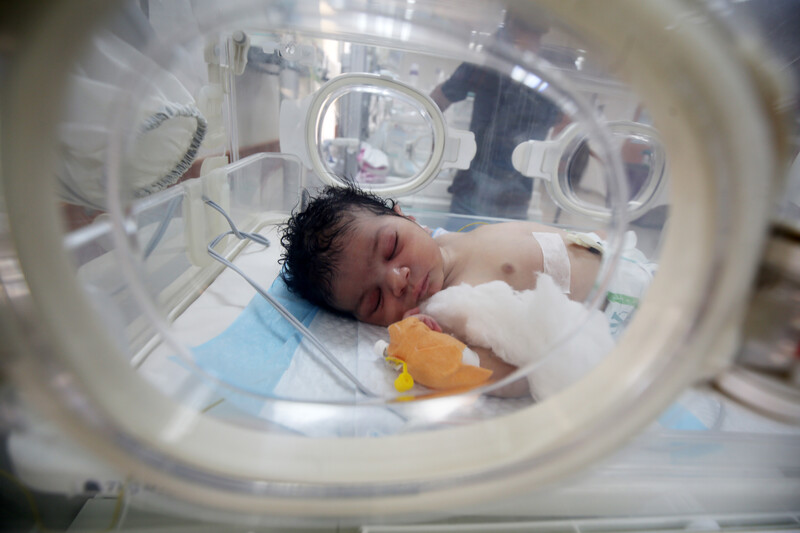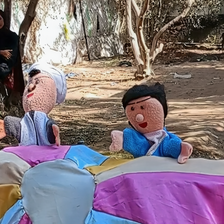The Electronic Intifada 26 December 2024

A premature baby in Deir al-Balah. The destruction of fertility centers in Gaza have seen thousands of dreams of family life destroyed.
APA imagesIsrael’s genocidal 14-month old assault on Gaza has undermined the dreams of many people, especially parents or would-be parents like Manal Hamid.
“I suffer from a split uterus which prevents me from having children,” Manal, 39, told The Electronic Intifada in November.
Manal had been receiving fertility treatment for years. She and her husband, Raed, held on to a thin thread of hope that they would have a child by having one of her frozen eggs fertilized with her husband’s sperm at Al Basma Fertility Center in Gaza City.
“The doctor told me that the success rate of this operation is 90 percent,” she said. So expectant was she, that she had already chosen names.
“If the baby is a boy, I will name him Shaker, which means ‘thankful,’ and if it is a girl, I will name her Amal, which means ‘hope’,” Manal said.
Manal had used up all her savings and even sold her wedding ring to pay for the treatment.
There were at least nine clinics in the Gaza Strip that performed in vitro fertilization (IVF), and these clinics would all send fertilized embryos to the Basma clinic. But in April, an Israeli shell destroyed the clinic and with it some 4,000 frozen embryos, 1,000 sperm and unfertilized egg samples, and Manal’s hopes of finally being a mother.
A child killed
“When I heard the news of the destruction of the fertility center, I felt that my life was over. The war had even killed the child who had grown up in my imagination,” Manal said.
Today, Manal and Raed live in a tent inside a shelter for displaced people west of Deir al-Balah. They fled their Gaza City home in January after it was destroyed in an Israeli airstrike.
“I feel that our lives no longer have any meaning,” said Raed.
Raed asked himself out loud why Israel had targeted the Basma clinic and then immediately answered his own question.
“What is happening is an organized genocide against the Palestinian people targeting even generations who have not yet been born.”
For Munira Shaheen, 32, the journey to childbirth has also not been easy. After three years of fertility treatments and psychological challenges, she became pregnant through IVF in September 2023.
Tests indicated that Munira was pregnant with twins. Her joy was indescribable. But it did not last long.
Impossible pain
Munira was carefully managing her fragile pregnancy when she was forced to flee her home in Gaza City due to Israel airstrikes and displacement to the southern part of the Strip.
She said she had to walk about three miles to reach a safe area.
“Because of the displacement, I suffered health complications that led to a miscarriage,” she told The Electronic Intifada.
“I screamed for hours and cried until my tears ran out because no one understands the pain of this experience except those who have lived it.”
Dr. Muhammad Ajour, director of the embryo lab at the Basma fertility center, told The Electronic Intifada the Israeli shell that hit the center “destroyed … 4,000 dreams for couples waiting to have a child,” in reference to the 4,000 frozen embryos lost.
Ajour said the Basma center was the most important of the nine fertility clinics in Gaza, as it was the main bank for freezing samples of sperm, unfertilized sperm and eggs.
The samples were kept in special laboratories under specific conditions at a temperature of 196 degrees centigrade below zero.
“There are couples who have been trying to have a child for more than 20 years,” he said, “but one shell shattered their dream and destroyed the future of their offspring.”
A genocidal plot?
Ajjour said the destruction of fertilization centers “was part of an Israeli strategy to cut off the Palestinian lineage as one of the methods of genocide against the Palestinian people.”
Salah Abdel Ati of the International Commission to Support Palestinian Rights said the targeting of fertilization and embryo preservation centers is a serious violation of human rights law, international law and conventions.
He stressed during an interview with The Electronic Intifada that this is an attack on the reproductive rights of individuals and families, which contradicts international legal texts.
Abdel Ati said that Article 23 of the International Covenant on Civil and Political Rights of 1966 confirms that “the family is the natural and fundamental group unit of society and is entitled to protection by society and the state, and emphasizes the freedom of men and women to form a family.”
He also referred to Article 7 of the 1989 Convention on the Rights of the Child, which stipulates the child’s right to be born and to know and be cared for by his or her parents.
If these fertility centers were deliberately targeted absent any legitimate military exception, Abdel Ati said, “this could be considered a war crime under the Rome Statute of the International Criminal Court, which prohibits the destruction of civilian property.”
Rasha Abou Jalal is a journalist in Gaza.





